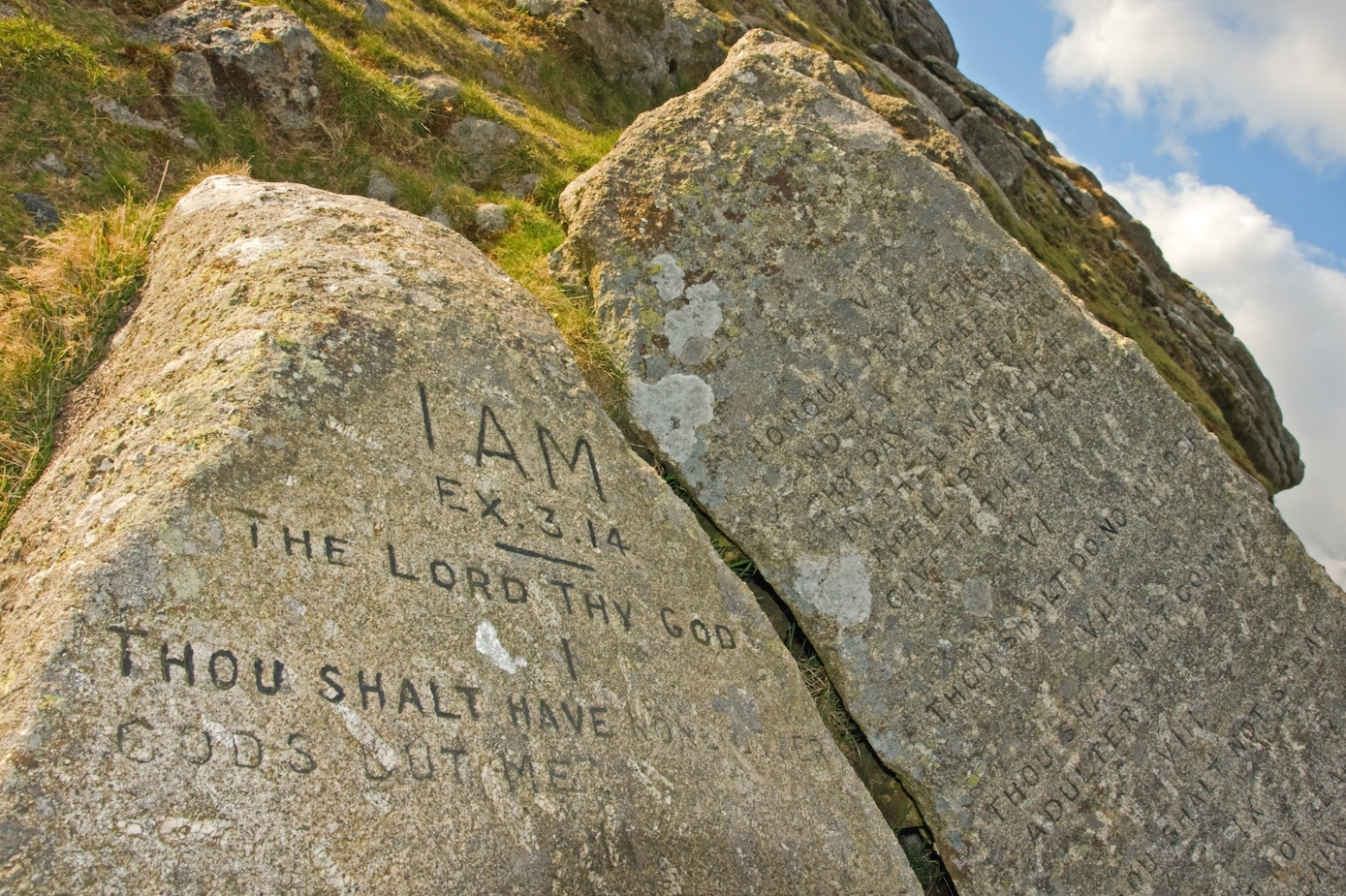Why Old Testament Laws Aren't Invalid
Por | Publicado en Estudiar la Biblia
Myth: The strange-sounding laws in the Old Testament make the Bible irrelevant for people today.
Busted: You don’t have to read far in the Bible to find some rules we don’t follow today—and you might wonder why they’re still in there and if they invalidate the rest of the Bible. Whether you’re reading through the first five books of the Bible or just doing a Google search, you’ll find some laws that stand out to you as odd—and definitely not widely practiced today. Here are some from the Bible’s third book, Leviticus:
• Don’t eat animals with split hooves (11:4–7).
• Don’t eat animals that don’t have fins and scales (11:9–10).
• Don’t mate two different kinds of animals (19:19).
• Don’t plant two different kinds of seed in your field (19:19).
• Don’t wear clothing made from two different types of fabric (19:19).
• Don’t trim off hair at your temples (19:27).
• Don’t trim your beard (19:27).
You get the idea: these are not often practiced today. The myth is that if these don’t matter, then why should the rest of the rules matter? Who decides which ones matter and which don’t? If we can choose which Bible rules to follow, then it’s probably not an authoritative book to follow, right?
Wrong.
To bust this myth, our approach has two parts: First, we back up to the beginning: what did these verses mean to their first hearers? We can use anything in the above list as our starting point, so let’s take verse 19 as an example. It’s split into three parts: don’t mix animals, don’t mix seeds, and don’t mix fabrics. Why? To answer that, we’ll need to discover the purpose of the book they’re in.
Leviticus is a word related to the noun “Levite,” used to describe people from the tribe of Levi. God chose these men to be His priests, representing God to the people. The Book of Leviticus, then, is a book of instructions from God to the priests and the Israelite people. In Hebrew, this book is titled “And He called” (simply the first few Hebrew words of the book), referring to the opening lines: “The LORD called to Moses from the Tabernacle and said to him, ‘Give the following instructions to the people of Israel’” (1:1–2, NLT). So, why did these people need instructions?
The Israelites had just left Egypt after four hundred years of slavery. They had known nothing else for generations. God called them out and led them to a new land, and He was reminding them of who they were and where they came from before they were slaves. Their oral history would be recorded in the first five books of the Bible, from their origin story through the laws God was giving them. A new life in a new land demands a new way of looking at the world—and that way was actually the old way God gave them in the first place. But the Israelites had some unlearning to do.
The Israelites weren’t Egyptians, but they had lived in Egypt long enough to understand the culture and religious beliefs of Egypt. Back then, culture, religion, politics, and economics (and more) were all one; there was no separation of church and state. But Egypt believed in many gods, whereas the God of Israel was one God who created everything. The Israelites’ new land was a place called Canaan, and people of that land served many gods, too.
Some of these gods were responsible for fertility—of the earth and of humans. Most notably, the god Baal was worshipped in many ancient Near Eastern communities as the main god of fertility, and he required sacrifices and rituals, including mixing two unlike elements together when people desired more crops or more children. For ancient Near Eastern people, this was a magical practice and an attempt to get the attention of a god who would then send more rain for their fields or cause them to become pregnant.
Now, verse 19 of Leviticus makes more sense. God was telling His people, “You don’t need to mix things like seeds, animals, and fabric in order for a fertility god to give you crops or children. I am the one true God, and you can ask Me for what you need.” Mixing these things would have made the Israelites look just like the Canaanites.
In the second verse of this chapter, God explains the why behind these rules: “Give the following instructions to the entire community of Israel. You must be holy because I, the LORD your God, am holy” (19:2). God used the word holy to describe being set apart and pure; it’s the opposite of the word common. God inspired the Book of Leviticus to show His holiness in contrast to other gods and to show how His people could be holy—that is, set apart for Him. The question the Book of Leviticus answers is, “What did it look like to live for God in the ancient Near East?”
We can ask a similar question today: “What does it look like to live for God in the twenty-first century?” Times have changed, and it looks far different to live for God, but the point is the same: When you live for God, your life will look different from the lives of those around you.
But why don’t we follow these specific mixing rules today? The second part of busting this myth takes us to the New Testament because we best understand the first part of the Bible (the Old Testament) in light of the second (the New). All the laws were put in place by God who promised a new era—an era the priests, prophets, and people looked forward to when a divine ruler would come and fulfill the Law. The New Testament demonstrates that this ruler is Jesus, and He said, “Don’t misunderstand why I have come. I did not come to abolish the law of Moses or the writings of the prophets. No, I came to accomplish their purpose” (Matthew 5:17, NLT). So the principle of holiness remains, but the laws of not mixing seeds and fabrics don’t remain. The apostle Paul had this to say about it to Gentiles (non-Jewish people): “You no longer live under the requirements of the law. Instead, you live under the freedom of God’s grace” (Romans 6:14, NLT).
So we live in God’s grace, but is God still holy? Yes. Does God still call people who believe in Him to act according to godly principles rather than worldly principles? Yes. Will that look differently today than it did in the 13th century BC? Yes. Think of it this way: if Moses’s audience read a manual for successful godly living in today’s world, would they understand it? No.
Today, crossbreeding, mixing seeds and fabrics in clothing are of little to no religious significance in many cultures. But what are some other things we do that demonstrate our faith? What about the words we speak, the places we go, the jobs we hold, the friends we have, the ways we spend our time? The principle behind these seemingly strange verses holds today: What we do shows what we believe. Let’s evaluate how well our faith shines through our actions.
Busted: You don’t have to read far in the Bible to find some rules we don’t follow today—and you might wonder why they’re still in there and if they invalidate the rest of the Bible. Whether you’re reading through the first five books of the Bible or just doing a Google search, you’ll find some laws that stand out to you as odd—and definitely not widely practiced today. Here are some from the Bible’s third book, Leviticus:
• Don’t eat animals with split hooves (11:4–7).
• Don’t eat animals that don’t have fins and scales (11:9–10).
• Don’t mate two different kinds of animals (19:19).
• Don’t plant two different kinds of seed in your field (19:19).
• Don’t wear clothing made from two different types of fabric (19:19).
• Don’t trim off hair at your temples (19:27).
• Don’t trim your beard (19:27).
You get the idea: these are not often practiced today. The myth is that if these don’t matter, then why should the rest of the rules matter? Who decides which ones matter and which don’t? If we can choose which Bible rules to follow, then it’s probably not an authoritative book to follow, right?
Wrong.
To bust this myth, our approach has two parts: First, we back up to the beginning: what did these verses mean to their first hearers? We can use anything in the above list as our starting point, so let’s take verse 19 as an example. It’s split into three parts: don’t mix animals, don’t mix seeds, and don’t mix fabrics. Why? To answer that, we’ll need to discover the purpose of the book they’re in.
Leviticus is a word related to the noun “Levite,” used to describe people from the tribe of Levi. God chose these men to be His priests, representing God to the people. The Book of Leviticus, then, is a book of instructions from God to the priests and the Israelite people. In Hebrew, this book is titled “And He called” (simply the first few Hebrew words of the book), referring to the opening lines: “The LORD called to Moses from the Tabernacle and said to him, ‘Give the following instructions to the people of Israel’” (1:1–2, NLT). So, why did these people need instructions?
The Israelites had just left Egypt after four hundred years of slavery. They had known nothing else for generations. God called them out and led them to a new land, and He was reminding them of who they were and where they came from before they were slaves. Their oral history would be recorded in the first five books of the Bible, from their origin story through the laws God was giving them. A new life in a new land demands a new way of looking at the world—and that way was actually the old way God gave them in the first place. But the Israelites had some unlearning to do.
The Israelites weren’t Egyptians, but they had lived in Egypt long enough to understand the culture and religious beliefs of Egypt. Back then, culture, religion, politics, and economics (and more) were all one; there was no separation of church and state. But Egypt believed in many gods, whereas the God of Israel was one God who created everything. The Israelites’ new land was a place called Canaan, and people of that land served many gods, too.
Some of these gods were responsible for fertility—of the earth and of humans. Most notably, the god Baal was worshipped in many ancient Near Eastern communities as the main god of fertility, and he required sacrifices and rituals, including mixing two unlike elements together when people desired more crops or more children. For ancient Near Eastern people, this was a magical practice and an attempt to get the attention of a god who would then send more rain for their fields or cause them to become pregnant.
Now, verse 19 of Leviticus makes more sense. God was telling His people, “You don’t need to mix things like seeds, animals, and fabric in order for a fertility god to give you crops or children. I am the one true God, and you can ask Me for what you need.” Mixing these things would have made the Israelites look just like the Canaanites.
In the second verse of this chapter, God explains the why behind these rules: “Give the following instructions to the entire community of Israel. You must be holy because I, the LORD your God, am holy” (19:2). God used the word holy to describe being set apart and pure; it’s the opposite of the word common. God inspired the Book of Leviticus to show His holiness in contrast to other gods and to show how His people could be holy—that is, set apart for Him. The question the Book of Leviticus answers is, “What did it look like to live for God in the ancient Near East?”
We can ask a similar question today: “What does it look like to live for God in the twenty-first century?” Times have changed, and it looks far different to live for God, but the point is the same: When you live for God, your life will look different from the lives of those around you.
But why don’t we follow these specific mixing rules today? The second part of busting this myth takes us to the New Testament because we best understand the first part of the Bible (the Old Testament) in light of the second (the New). All the laws were put in place by God who promised a new era—an era the priests, prophets, and people looked forward to when a divine ruler would come and fulfill the Law. The New Testament demonstrates that this ruler is Jesus, and He said, “Don’t misunderstand why I have come. I did not come to abolish the law of Moses or the writings of the prophets. No, I came to accomplish their purpose” (Matthew 5:17, NLT). So the principle of holiness remains, but the laws of not mixing seeds and fabrics don’t remain. The apostle Paul had this to say about it to Gentiles (non-Jewish people): “You no longer live under the requirements of the law. Instead, you live under the freedom of God’s grace” (Romans 6:14, NLT).
So we live in God’s grace, but is God still holy? Yes. Does God still call people who believe in Him to act according to godly principles rather than worldly principles? Yes. Will that look differently today than it did in the 13th century BC? Yes. Think of it this way: if Moses’s audience read a manual for successful godly living in today’s world, would they understand it? No.
Today, crossbreeding, mixing seeds and fabrics in clothing are of little to no religious significance in many cultures. But what are some other things we do that demonstrate our faith? What about the words we speak, the places we go, the jobs we hold, the friends we have, the ways we spend our time? The principle behind these seemingly strange verses holds today: What we do shows what we believe. Let’s evaluate how well our faith shines through our actions.



